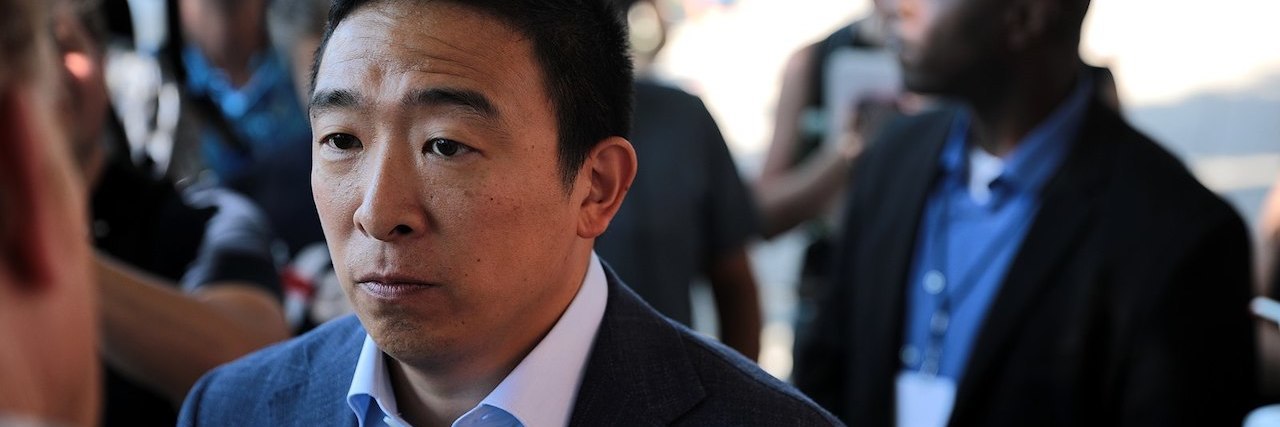How Andrew Yang's Recent Comments Stigmatize Mental Illness
Update 6/18/20: At the New York Mayoral Debate, Andrew Yang reiterated false and harmful comments about people with mental illness, saying: “People with mental illness have rights. But you know who else has rights? We do: the people and families of the city. We have the right to walk the city and not fear for our safety because a mentally ill person is going ot lash out at us.” See his comments here.
Recently on Fox, New York’s frontrunner candidate, Andrew Yang, espoused stigmatizing beliefs about mental illness.
Yang was asked about police involvement and the use of mental health professionals during situations when people are homeless and on the subway. Here is Yang’s response.
“[I]f you have someone who is mentally ill on the subway, you’re going to need a police officer at least present…to help improve the situation. Because if you just send in a psychologist or a therapist, they’re going to struggle…I think that police are going to drive our ability of what’s going on in our streets and subway. Mental health resources are a big part of it, but you can’t have them alone…”
As a therapist and researcher who studies mental health stigma, I was taken aback by Yang’s careless comments, which illustrate his lack of mental health awareness, and exemplifies why stigma is so prevalent.
Let’s breakdown why Yang’s comments and policies are problematic from a mental health perspective.
1. Yang spreads the stigmatizing myth that people with mental illness are dangerous.
Yang asserted that “you’re going to need a police officer” present if you have “someone who’s mentally ill on the subway,” strongly implying that people with mental illness are dangerous and threatening — thus perpetuating a false and debunked mental illness stereotype that many Americans still believe.
Studies show that people with mental illness (like mood and anxiety disorders, etc.) are not more likely to commit violence than people without mental illness.
Rather, people with mental illness are more likely to be victims of violence, including by police. People with mental illness are 16 times more likely to be fatally shot during a police encounter than other civilians. Remember in 2020 when Linden Cameron, a 13-year-old boy with autism, was repeatedly shot unarmed by officers after his mother sought help for his mental health crisis?
When given a national stage, Yang should be more responsible and accurate when speaking about mental illness.
2. Yang makes an unjustified statement about mental health professionals’ competencies.
Yang declared that mental health professionals would “struggle” when responding to situations with people experiencing homelessness. Yang cites no study and offers no reason for why he thinks they would “struggle” without police involvement. As a psychologist trainee, this is an insult to my field and people with mental illness.
Mental health professionals, by definition, have years of specialized training. Clinical psychologists, for example, undergo five to seven years of doctoral training with additional years of postdoctoral training to obtain licensure.
I work in a residential center with homeless veterans. Several residents, though not most, have severe mental health problems. I can say, unless there is reason to suspect someone will be imminently violent to themselves or others, there is no police involvement when interacting with residents.
If there is an incident, we are trained to assess, handle and de-escalate the situation. That’s our job. Police officers are not trained in those tactics, and police intervention can actually make the situation worse. So, Yang’s statement that we need police “to improve the situation” is not just wrong but potentially harmful.
Denver’s STAR (Support Team Assisted Response) program is one evidence-based intervention that safely and efficiently intervenes with mental health episodes. STAR consists of a clinician and a paramedic handling incidents, like Yang’s situation on the subway. In STAR’s first six months, STAR responded to 748 incidents; none required police or arrests, and it allowed officers to instead focus their efforts on crime.
3. Yang’s “mentally ill” phrasing shows a lack of understanding of mental illness.
In reducing stigma, language matters because it influences how people view and treat people with mental illness. While I applaud Yang for using person-first language, saying “someone who is mentally ill,” he still used the phrase “mentally ill,” rather than phrases many prefer like “someone who has mental illness” or “someone with a mental health condition.”
Yang’s tone implies that “the mentally ill” are a separate group entirely — that there’s something different about “them.” While it’s true that mental illness, by definition, is a real and debilitating experience, it is also true that mental illness is common.
In the U.S., one in five people experience mental illness each year. Suicide is the 10th leading cause of death, and for every death by suicide, 25 more attempts occur. Most people know someone with mental illness. For Yang to use the phrase “mentally ill” in a derogatory tone is shaming about half of Americans who, at some point, will likely experience mental illness.
As the frontrunner of New York’s mayoral race, Andrew Yang can use his platform to decrease, rather than perpetuate, mental health stigma. He can do this by spreading accurate mental health information and supporting evidence-based policies.
Image via Gage Skidmore (Wikicommons)

